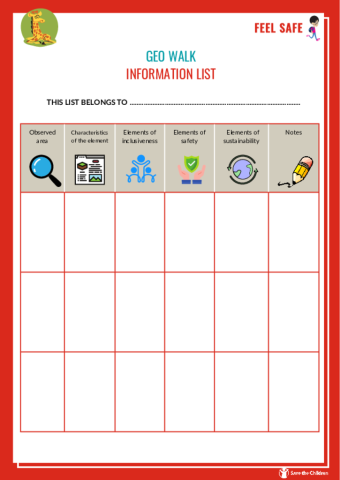Geo Walk
Objectives:
- Practice observation
- Get to know your territory
- Develop organisational skills
STEP BY STEP
The teacher introduces the 2030 Agenda for Sustainable Development using the glossary definition:
Agenda 2030 for Sustainable Development - list of 17 Sustainable Development Goals (SDGs) and 169 targets, signed in September 2015 by the governments of the 193 UN member countries to improve people's economic well-being, health care and care for the planet.
An in-depth look at the Agenda's contents is available at the United Nation website (link).
Among the Agenda's goals, Goal 11 aims to 'Make cities and human settlements inclusive, safe, durable and sustainable'. Ways to achieve the goal include reducing the number of people affected by disasters, especially among the poorest and most vulnerable groups, and increasing resilience to disasters.
An in-depth look at the contents of Goal 11 is available at the United Nation website (link).
SUSTAINABLE CITIES
The teacher introduces the activity by asking the class: what should a city have in order to be environmentally liveable? And what to be more disaster resistant? How should spaces be organised?
Taking turns, each student will point out one or more features of the city that can make it safer and more environmentally, economically and socially sustainable (the teacher can review with the class the definition of sustainability Development that ensures that the needs of the present generation are met without compromising the ability of future generations to meet their own needs in the glossary to guide the activity).
SAFETY AND SUSTAINABILITY IN OUR CITY
At this point, organise a geo-walk to explore your city (or neighbourhood) with the aim of mapping the presence of the elements of inclusiveness, safety A condition that makes one feel that one is not in danger or that a risk can be prevented or reduced and sustainability Development that ensures that the needs of the present generation are met without compromising the ability of future generations to meet their own needs that contribute to achieving Goal 11 of Agenda 2030.
With the help of the teacher, the class prepares an observation grid on which to insert a list of elements to be identified and the information gathered during the exploration of the area. The teacher can share the glid in the attachment "Geo walk - Information list" (below).
Once the observation grid has been created, one proceeds with the organisation of the outing. Google Maps or Google Earth is opened and the itinerary is traced by entering a map point for each place of interest. The outing is organised: everyone has a grid with them, takes notes and photos. Back in the classroom, the collected elements are compared and arranged in a single grid. The students choose the photos to be printed and produce a final work with all the pictures.
CONCLUDING THOUGHTS
What can be the role of each of us as individuals and as a community in making our city or neighbourhood inclusive, safe, durable and sustainable? The class can discuss and identify some strategies that can be implemented in everyday life, such as protecting the environment and caring for the green areas around the school.
The teacher can consult the website of BBC (link) to stimulate reflection.

Add new comment